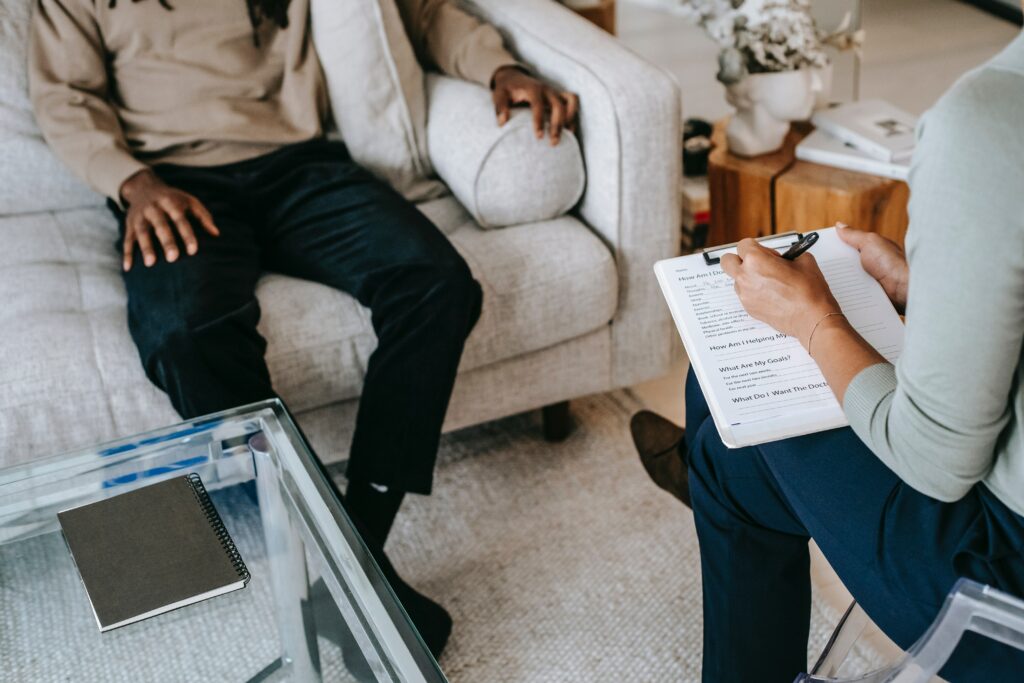Article At Glance:
- Use mindfulness, body awareness, and rhythmic movements to reconnect mind and body.
- Recognize and reduce stressors like work, relationships, and life events causing numbness.
- Seek support from friends, family, and therapists to avoid isolation. Healing occurs within a community.
- Prioritize self-care: sleep well, spend time outside, and bond with pets to reconnect mind and body.
Do you want to stop feeling emotionally numb? In this therapist approved article, learn what causes emotional numbness and the most current strategies for getting your feelings back to normal.
Have you ever felt that the world is moving all around you, but there you are standing still? Or have you felt as if you were just going through the motions of your day as if you were on autopilot? Chances are you were experiencing what it is like to feel emotionally numb. I am a believer that emotions and feelings are neither good or bad, simply pleasant and unpleasant. However, with numbness, it is neither pleasant nor unpleasant. Numbness is simply an absence of emotion.
People have also described emotional numbness as: emptiness, isolation, hopelessness, disconnected, ungrounded, unfocused. One of my favorite bands, Jawbreaker, put it so eloquently, “This is my condition: desperate, alone, without an excuse, I try to explain. Christ, what’s the use?”

8 Signs of Emotional Numbness:
- Loss of interest in activities that you once found enjoyable
- Distant/detached from others and the world
- Disconnected from one’s body and thoughts
- Unable to access feelings and emotions
- Feel flat, physically and emotionally
- Inability to fully participate in life
- Isolating
- Feeling empty

Needless to say the limbic system does a lot for us.
Since the limbic system consists of many parts, today we are going to focus on just the hippocampus and the amygdala.
The hippocampus’ primary functions are with memory and learning. Our hippocampus takes our episodic memories and stores them away into our long-term memory banks
The primary function of the amygdala centers around emotional regulation (anger, anxiety, fear, pleasure). The amygdala then takes the content of the emotions and attaches them to a memory. The stronger the emotion, the stronger the memory.

What causes emotional numbness?
Before I highlight diagnoses that are associated with emotional numbness, I would like to first acknowledge how our brains function; specifically, the limbic system.
I love nerding out on neurology and cognitive functioning. Our brains are more than just mushy matter. Our brains keep us functioning. For the sake of this blog, let’s discuss the limbic system to better understand our emotional experiences. The limbic system is responsible for many of our day-to-day functioning:
- Autonomic functioning (Hormonal production/release, heart-rate, blood pressure, circadian rhythm, sexual arousal)
- Appetite
- Attention
- Memory
- Emotional regulation/memory
- Social cognition
- Reward circuitry

Chances are, you have heard someone compare our brains to a computer. What happens when your computer becomes overheated or has too many systems running at once? It shuts down.
What does our brain do when the limbic system becomes overwhelmed? It shuts down.
What does emotional numbness feel like? Like we have shut down. Now I do not want to demonize shutting down, in fact it can be a survival mechanism. Our brains are attempting to protect us. This survival mechanism could have been stored in our memory banks from as far back as childhood.
Emotional numbness is associated with several diagnosis:
- Depression
- Anxiety
- PTSD
- Substance Use/Misuse
- Dissociative Disorders
- Borderline Personality Disorder
- Schizophrenia
Emotional numbness can also be associated with other lived experiences that are not diagnosed in the DSM-5:
- Grief
- Medication side effects
- Chronic stress
- Brain injury

What should you do when you feel emotionally numb?
I often experience people coming into therapy asking:
- How do I get out of this funk?
- How do I get out of bed when I am depressed?
- What can I do to overcome this numbness?
All too often I hear people judging their numbness as being “lazy,” please check out my colleague Shahani Samarasekera’s blog post to recognize Laziness versus Depression.
One action you can take to address emotional numbness is getting connected to the right mental health professional. We have a phenomenal team of therapists who can hold space and provide coping skills.
6 ways you can cope with emotional numbness:
1. Ground yourself:
Mindfulness is a powerful skill and a lifelong practice. Mindfulness skills allow the limbic system to re-regulate. One mindfulness skill that comes to mind is body awareness. When we are feeling emotionally numb, we are experiencing a disconnect from our body and any physical sensations. Thus, we need to rebuild that connection. Here are some guided meditations that I use either with my clients or even myself: body awareness; progressive muscle relaxation; stone flake on a lake (DBT).

2. Movement:
In a previous post I talked about How To Recover From Emotional Trauma. In the article I highlighted how trauma takes a toll on our bodies. We know that emotional numbness is experienced by those living with PTSD. Experts recommend that we move our bodies for at least 30-minutes a day. One thing experts do not always tell us is that we can do that all at once or break that down into three 10-minute intervals. When we engage in movement our mind and bodies reconnect….just like with mindfulness. If you think about it, movement requires mindfulness. (are you picking up on a pattern here?)
The kind of movement is also important. It is suggested to engage in movements that are rhythmic, using both arms and legs. For example: walking, running, swimming, and dancing. These rhythmic bilateral movements are important because they allow the brain to essentially “get back online.”

3. Identify Stressors and Attempt to Minimize:
It is important to minimize stressors no matter how big or small in order to avoid the pull to evade feelings and emotions that comes with emotional numbness. It is helpful to identify current life stressors (work, school, relationships, political climate, pandemic, major life events) that are contributing to feelings of anxiety, fear, and worry. Once the stressors are identified, you can then make a plan on your own or with someone you trust, to attempt to minimize the stressors. For example, asking someone to help with errands/chores or asking for extensions with projects/assignments (BTS: I asked for an extension on this blog because I had a lot going on in my own life when I was first approached to write it).

4. Reach out to your social support:
Healing takes place in a community. That community can consist of a therapist or friends and family. Community reminds us that we are not alone and that we do not have to face what we are facing by ourselves. Communities allow us to lean on and learn from others.

5. Sleep:
Sleep is one of the most important ways to take care of ourselves. Sleep provides our brains and bodies a chance to recharge. If we are not getting enough sleep we feel the wear and tear on our bodies and notice our memory recall might not be as powerful as it was the day before. We also might feel crabby, short, irritable. If you find yourself struggling with sleep, I encourage you to develop a sleep routine. You can check out Dr. Kristen Casey’s Instagram or TikTok. Dr. Casey is a clinical psychologist and sleep expert. Just do not check out her page before bed because we all know screen time is a big NO before bed.

6. Put down technology and go touch some grass or spend time with your pet:
This part is self explanatory….disconnect from your screens and go outside while the weather is still nice (especially if you are in an area that experiences all four seasons). Go cuddle with a pet if you have one because pets help regulate blood pressure. In fact, I believe our pets can teach us valuable lessons in love, friendship, relaxation, and joy.


